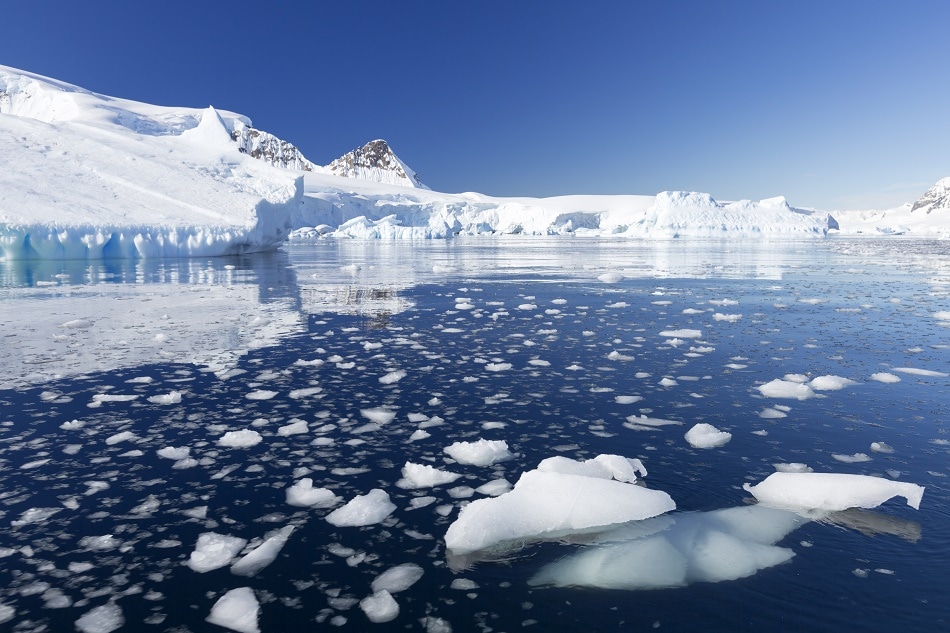
Image credits: Denis Burdin/shutterstock.com
Due to the current climate crisis, today’s environmental discourse is focused on the future of Earth’s climate.
Scientists at the University of Chicago are studying the role that the ocean plays in the carbon cycle and using their findings to simulate models of environmental change and are making forecasts for the future.
The Chicago-based researchers have recently simulated a chain of events that demonstrates how an increase in Arctic sea ice culminates in an ice age.
Aimed at better understanding the cycles of the Earth’s climate over geological time, the study draws parallels with shifts in the ocean’s carbon storage and periods of environmental change. Thus, seeking to discover and understand the processes that make up a global climate.
One key question in the field is still what caused the Earth to periodically cycle in and out of ice ages. We are pretty confident that the carbon balance between the atmosphere and ocean must have changed, but we don't quite know how or why.
Malte Jansen, Assistant Professor, The Department of Geophysical Science, The University of Chicago
Some believe that we are currently in between ice ages as typically ice sheets grow in cooler periods and then retreat in warmer periods on a periodical basis. However, due to the current rate at which we are pumping carbon dioxide (CO2) into the atmosphere then we could see a delay in cooling as the planet gets warmer.
One of the other factors that contributes to the ice age cycle is changes in the Earth’s orbital cycle which impacts glacial and interglacial formation. Yet, Jansen and his research partner Alice Marzocchi, a former postdoctoral researcher at the University of Chicago and now research scientist at the UK’s National Oceanography Centre, believe carbon storage in the oceans may also play a pivotal role.
Understanding the outsized role played by carbon storage in the ocean can help scientists more accurately simulate future environmental change.
Alice Marzocchi, Research Scientist, The National Oceanography Centre
The recent study, published in the journal Nature, built on a previous model of how glacial transitions occur and allowed them to produce a consistent picture of glacial climates. Their simulation demonstrated how increases of Arctic sea ice is initiated by a cooling of the Earth’s atmosphere. Jansen stated, “As a result, increased Antarctic sea ice has outsize consequences.”
As the sea ice builds it affects ocean circulation as well as physically preventing the flow of carbon dioxide between the ocean and atmosphere. Thereby resulting in a continual build-up of CO2 in the deep ocean which also remains there. “The Southern Ocean around Antarctica plays a key role in ocean circulation, as it is a region where deep waters rise to the surface before disappearing again into the abyss,” says Jansen. Thus, less CO2 in the Earth’s atmosphere would mean a cooling of the planet which could eventually lead to an ice age.
"What this suggests is that it's a feedback loop," said Marzocchi. “As the temperature drops, less carbon is released into the atmosphere, which triggers more cooling.” This explanation also matches evidence from other studies that reveal CO2 in the sediments and glacial samples over longer periods of time. "What surprised me is how much of this increased storage can be attributed to physical changes alone, with Antarctic sea-ice cover being the key player," added Marzocchi.
Responsibility for the current climate crisis has been placed firmly in the hands of humanity and the accelerated rising rate of CO2 emissions due to the burning of fossil fuels and industry practices.
Yet, a better understanding of the contribution of other factors in conjunction with human impact will enable the prediction of more accurate future scenarios for ongoing changes in the climate. Thus, Jansen and Marzocchi’s study and simulation models will help develop a deeper understanding of the future of Earth’s ever-changing climate over longer periods of time.
Disclaimer: The views expressed here are those of the author expressed in their private capacity and do not necessarily represent the views of AZoM.com Limited T/A AZoNetwork the owner and operator of this website. This disclaimer forms part of the Terms and conditions of use of this website.